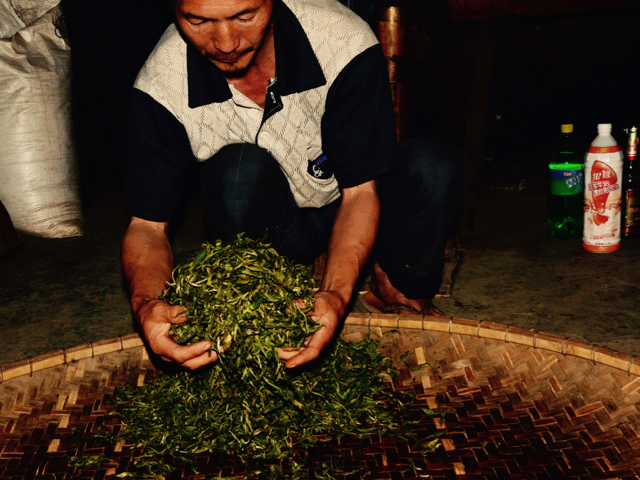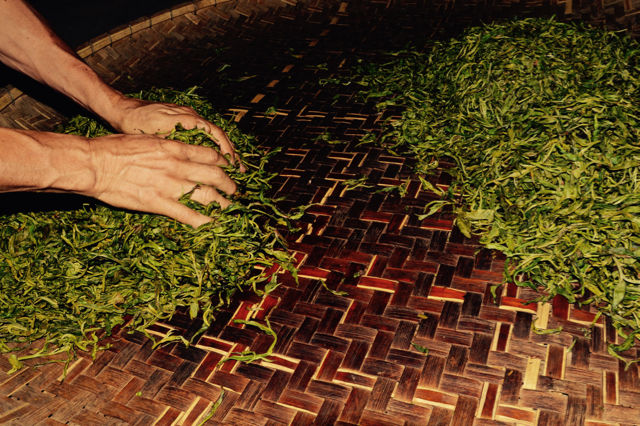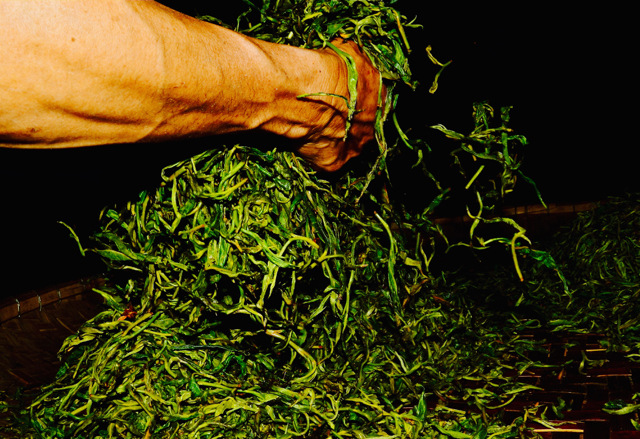Tea ends up in nuggets and in twisted desiccated things of tangy beauty. Cakes and compressed forms line shelves and delicate curled buds are unveiled out of boutique bags and wrapping. It ends up with names and tales scarcely believable at times.

Lifting the leaves so that they untangle and separate, post-frying.
There is a stage almost never mentioned in the processing of teas, and particularly in Puerh production. It is a simple stage that needs hands, a bit of time, and it absolutely requires a bent body over a steaming heap of newly fried limp tea leaves.
I call it “the sort” but it is much more. Freshly fried leaves, expunged of their humidity come in balls and clumps from their wok’s or frying pans and are dumped onto rattan woven racks. They are then kneaded like dough, of any last moisture which is purged onto these racks. Then comes this wonderful “sort”.

Separating leaves into smaller bundles, the sort becomes a thing of soft touches that need the hands. No machine can sort like the hands.
Palms up, the ‘sorter’ will lift and separate the leaves to allow oxygen through the still moist leaves. This will continue until all the leaves have been completely plied apart. The leaves are then ready to dry in the sun and shade. Puerh needs this stage, and with so much within the tea world, it is the hands that supply the magic rather than any clever machines.
A simple stage that affects little but affects everything. Without the separation humidity will continue to work on the leaves…with the ‘sort’ comes a reliance on the old ways – the good ways.

Separating leaves close up post frying…essential and yet something almost forgotten.

About JeffFuchs
Bio
Having lived for most of the past decade in Asia, Fuchs’ work has centered on indigenous mountain cultures, oral histories with an obsessive interest in tea. His photos and stories have appeared on three continents in award-winning publications Kyoto Journal, TRVL, and Outpost Magazine, as well as The Spanish Expedition Society, The Earth, Silkroad Foundation, The China Post Newspaper, The Toronto Star, The South China Morning Post and Traveler amongst others. Various pieces of his work are part of private collections in Europe, North America and Asia and he serves as the Asian Editor at Large for Canada’s award-winning Outpost magazine.
Fuchs is the Wild China Explorer of the Year for 2011 for sustainable exploration of the Himalayan Trade Routes. He recently completed a month long expedition a previously undocumented ancient nomadic salt route at 4,000 metres becoming the first westerner to travel the Tsa’lam ‘salt road’ through Qinghai.
Fuchs has written on indigenous perspectives for UNESCO, and has having consulted for National Geographic. Fuchs is a member of the fabled Explorers Club, which supports sustainable exploration and research.
Jeff has worked with schools and universities, giving talks on both the importance of oral traditions, tea and mountain cultures. He has spoken to the prestigious Spanish Geographic Society in Madrid on culture and trade through the Himalayas and his sold out talk at the Museum of Nature in Canada focused on the enduring importance of oral narratives and the Himalayan trade routes.
His recently released book ‘The Ancient Tea Horse Road’ (Penguin-Viking Publishers) details his 8-month groundbreaking journey traveling and chronicling one of the world’s great trade routes, The Tea Horse Road. Fuchs is the first westerner to have completed the entire route stretching almost six thousand kilometers through the Himalayas a dozen cultures.
He makes his home in ‘Shangrila’, northwestern Yunnan upon the eastern extension of the Himalayan range where tea and mountains abound; and where he leads expeditions the award winning ‘Tea Horse Road Journey’ with Wild China along portions of the Ancient Tea Horse Road.
To keep fueled up for life Fuchs co-founded JalamTeas which keeps him deep in the green while high in the hills.



